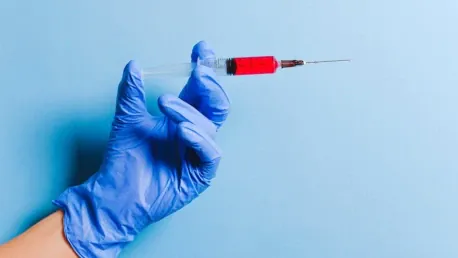The acceptance of the RSV vaccine in the United States is witnessing a significant upward trend, according to recent surveys by the Annenberg Public Policy Center (APPC). Conducted in October 2023 and November 2024, these surveys provide a detailed analysis of the changing public views on the RSV vaccine and other vaccinations amid a broader context of fluctuating vaccine hesitancy. The data reveals an intriguing increase in the perceived effectiveness and acceptance of vaccines despite lingering misinformation and political opposition, presenting an overview of the evolving landscape of public health perceptions in the country.
Rising Acceptance of the RSV Vaccine
The Centers for Disease Control and Prevention (CDC) recommended the RSV vaccine in 2023, and within a year, public acceptance has notably increased. The vaccine, particularly for pregnant individuals and adults aged 60 and older, has seen a marked rise in perceived effectiveness. Data from the surveys indicate that 52% of U.S. adults now believe the RSV vaccine for pregnant individuals is effective, up from 42% in October 2023. Likewise, 61% of respondents deem the RSV vaccine for older adults effective, an increase from 54% the previous year.
This surge in perceived effectiveness comes even though the feared ‘tripledemic’—a confluence of flu, COVID-19, and RSV—that caused over 100,000 deaths in the 2022-23 season didn’t materialize as severely. By December 2024, the CDC noted moderate levels of acute respiratory illnesses, with increasing flu and COVID-19 activities in some regions and high RSV activity, especially among young children. These conditions highlight the importance of vaccines in managing respiratory illness outbreaks and protecting vulnerable populations.
Political Challenges and Vaccine Hesitancy
Despite the rising acceptance of the RSV vaccine, challenges persist, notably from political figures nominated for health policy-making roles by President-elect Donald Trump. Key nominees like Robert F. Kennedy Jr. and Dave Weldon have voiced anti-vaccine sentiments, posing potential obstacles to broader vaccine acceptance and the success of public health initiatives. This political climate adds complexity to the ongoing discourse on vaccines, often hindering efforts to promote their benefits and safety.
The APPC survey, conducted between November 14-24, 2024, included a nationally representative sample of 1,771 U.S. adults, with a margin of error of ± 3.3 percentage points. The findings not only reflect changes in RSV vaccine perception but also provide insights into public sentiments regarding other vaccines. Such data underscores the nuanced challenges in navigating public health campaigns amidst politicized environments and combating misinformation that affects vaccine confidence.
Stability and Slight Increases in Vaccine Acceptance
A potential plateau in vaccine hesitancy, which had been rising in previous years, marks another significant aspect of the survey findings. Evidence from the November survey illustrates modest increases or stability in the public acceptance of various vaccines. For instance, 86% of respondents view the measles, mumps, and rubella (MMR) vaccine as safe, a rise from 81% in October 2023 and approaching the 88% level seen in August 2022. Similar stability is observed with the flu vaccine, considered safe by 83% of respondents, unchanged from the previous year. For the COVID-19 vaccine, 65% believe it is safe, consistent with October 2023 figures.
The steady perceived effectiveness of these vaccines indicates significant acceptance rates for long-established vaccines, though newer or recently highlighted vaccines, such as the COVID-19 and pneumonia vaccines, show lower acceptance rates, pointing to a slower public adaptation to new health guidelines. This pattern reflects broader trends where entrenched vaccines enjoy robust trust while newer ones navigate through skepticism and evolving public perceptions.
Recommendations for Family Members
Public recommendations for family members regarding vaccinations signify strong agreement on the importance of immunization across various age groups. Approximately 90% of respondents recommend the MMR vaccine for children aged 12-15 months or 4-6 years. The polio vaccine is recommended by 88% for children aged 2-6 months, reflecting enduring confidence in traditional vaccines. For children aged 11-12 years or adults, 85% would suggest the Tdap vaccine, and 82% advocate for the shingles vaccine for individuals aged 50 and older.
However, the HPV vaccine, given to children aged 11 or 12, sees a slightly lower recommendation rate at 79%. The pneumonia vaccine’s recommendation for individuals aged 50 and above stands at 77%, having fallen from 84% when the target age was 65 and older. These recommendations underscore a broad recognition of the importance of vaccines, especially among young and elderly populations. Despite stable vaccine uptake levels, the majority — 9 out of 10 respondents — accentuate the critical importance of vaccinating children, with 72% categorizing it as very or extremely important and 19% considering it somewhat important.
Flu and COVID-19 Vaccine Comparisons
According to recent surveys by the Annenberg Public Policy Center (APPC), acceptance of the RSV vaccine in the United States is showing a noteworthy increase. These surveys, conducted in October 2023 and expected to continue into November 2024, offer a comprehensive analysis of shifting public opinions on the RSV vaccine as well as other vaccinations. This is set against the backdrop of larger trends in vaccine hesitancy. The findings indicate a significant rise in how the effectiveness and acceptance of vaccines are perceived, even as misinformation and political dissent remain issues.
This interesting shift highlights the evolving landscape of public health perceptions in the country. People are becoming more aware of the benefits of vaccines, which is a positive change considering the widespread campaigns aimed at debunking myths and providing factual information. Although vaccine hesitancy is still a challenge, the data suggests that efforts to educate the public are bearing fruit.
Public health advocates and policymakers can use this information to further enhance their strategies, aiming to keep the upward trend of vaccine acceptance on track. This is particularly timely, as RSV and other viruses pose significant health risks, especially to vulnerable populations such as young children and the elderly. Increased vaccine acceptance can lead to better herd immunity and overall public health protection, underscoring the importance of continued education and clear communication from health authorities.









